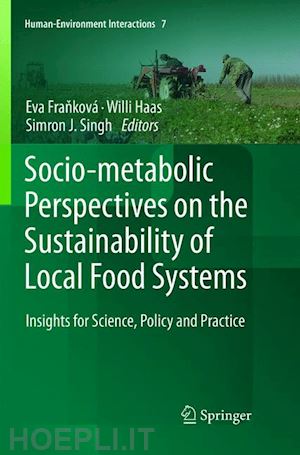
Questo prodotto usufruisce delle SPEDIZIONI GRATIS
selezionando l'opzione Corriere Veloce in fase di ordine.
Pagabile anche con Carta della cultura giovani e del merito, 18App Bonus Cultura e Carta del Docente
This book delves into diverse local food systems and critically assesses their ecological and societal benefits and trade-offs, their limits and opportunities for improving sustainability of food production, and framework conditions which either hinder or promote their development.
More and more people with gradually meat heavier diets will demand growth in food production, whilst our increasingly industrialized and globalized agri-food system has already caused serious sustainability problems in the past. This calls for a change in the way we produce, distribute and consume food. A re-emerging debate on food security and food sovereignty seems to support this quest. But what are the promising alternatives to mainstream developments?
Such a discussion regarding sustainability of local food systems requires a sound systemic understanding and thus invites a socio-metabolic reading of local cases by analyzing the nexus between material and energy flows as well as land and time use. This approach is needed to complement the so far mostly qualitatively-based local food studies. Applying socio-metabolic approaches to local food systems fosters a better understanding of promises and pitfalls for sustainable pathways in the future.











Il sito utilizza cookie ed altri strumenti di tracciamento che raccolgono informazioni dal dispositivo dell’utente. Oltre ai cookie tecnici ed analitici aggregati, strettamente necessari per il funzionamento di questo sito web, previo consenso dell’utente possono essere installati cookie di profilazione e marketing e cookie dei social media. Cliccando su “Accetto tutti i cookie” saranno attivate tutte le categorie di cookie. Per accettare solo deterninate categorie di cookie, cliccare invece su “Impostazioni cookie”. Chiudendo il banner o continuando a navigare saranno installati solo cookie tecnici. Per maggiori dettagli, consultare la Cookie Policy.